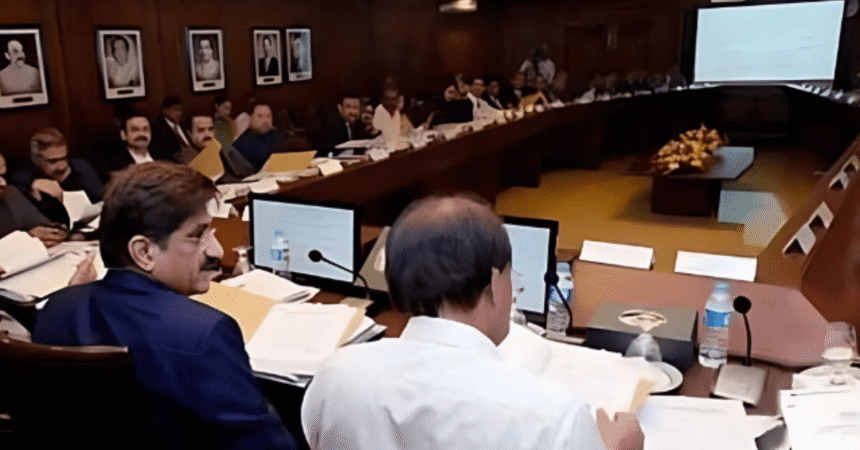The Sindh government’s recent initiative to ban plastic water bottles in official offices has been a step forward in addressing environmental pollution. However, the enforcement of this ban has encountered significant compliance issues, revealing a gap between policy and practice.
The Ban: A Policy Overview
In an effort to combat the growing issue of plastic waste and its detrimental effects on the environment, the Sindh government introduced a ban on plastic water bottles in government offices. This initiative is part of a broader strategy to reduce plastic waste and promote environmental sustainability. The policy aims to minimize the use of single-use plastics within government buildings, thereby setting a precedent for responsible environmental practices.
The policy was well-received by environmental advocates and the public alike, seen as a progressive move towards reducing the footprint of plastic waste. However, the implementation of this ban has proven challenging, as evidenced by recent investigations.
Uneven Enforcement: A Closer Look
An investigation by The Express Tribune has uncovered discrepancies in the enforcement of the plastic bottle ban. While the Chief Minister’s Secretariat has made efforts to comply with the new regulations, other government offices, including those within the Sindh Secretariat, have continued to use plastic bottles. This uneven application of the ban raises concerns about the overall effectiveness of the policy.
An anonymous employee from the Livestock Department, located near the Sindh Assembly, reported that plastic bottles are still prevalent within their offices. This situation suggests that the ban’s implementation is not as stringent as intended. The inconsistent enforcement highlights a critical issue: the gap between policy intentions and practical application.
Insights from Environmental Activists
The partial implementation of the plastic bottle ban has drawn attention from environmental activists, who emphasize the need for stricter enforcement to achieve meaningful results. Mahmood Alam Khalid, an environmental activist based in Karachi, stresses that the success of such initiatives depends heavily on rigorous enforcement. Khalid points out that while the ban is a step in the right direction, its impact is limited by the lack of uniform compliance across all government offices.
Khalid’s concerns are echoed by Muhammad Toheed, Associate Director at the Institute of Business Administration’s (IBA) Urban Lab. Toheed argues that even if the ban were fully enforced in government offices, it would only have a marginal effect on overall environmental pollution. He highlights that the majority of plastic bottle consumption occurs in the private sector, including offices, restaurants, and other commercial establishments. Toheed advocates for extending the ban to these areas to enhance its effectiveness and achieve a more significant impact.
The Broader Waste Management Context
To fully understand the implications of the plastic bottle ban, it is essential to consider it within the broader context of waste management in Pakistan. According to a report by the US International Trade Administration, Pakistan generates approximately 87,000 tonnes of solid waste each week. Karachi, the country’s largest city, contributes a substantial 16,500 tonnes of waste daily. This massive volume of waste underscores the scale of the challenge faced in managing plastic and other types of waste.
Environmental activist Afaaq Bhatti from Karachi highlights that plastic waste is the second most common form of waste in the city, following kitchen waste. Despite the large volume of plastic waste generated, the city only manages to recycle about 6 tonnes of waste daily. This figure is significantly lower than the potential 7,000 tonnes that could be recycled with improved infrastructure and resources. The disparity between waste generation and recycling capabilities reflects a broader issue in waste management that extends beyond government offices.
Challenges in Waste Management
The challenges associated with managing plastic waste are multifaceted. On one hand, there is a need for more robust recycling infrastructure to handle the growing volume of waste. On the other hand, there is a pressing need for changes in consumption patterns and waste management practices across various sectors.
One of the primary challenges is the inadequate recycling infrastructure, which limits the capacity to process plastic waste effectively. Investment in modern recycling facilities and technologies is crucial to address this issue. Additionally, increasing public awareness about the environmental impact of plastic waste and encouraging responsible consumption are essential steps in managing plastic waste more effectively.
Recommendations for Effective Implementation
To enhance the effectiveness of the plastic bottle ban and address the compliance issues, several recommendations can be considered:
- Uniform Enforcement Across All Offices: Ensuring that the ban is uniformly enforced across all government offices is crucial. This could be achieved through regular audits and inspections to monitor compliance. Addressing lapses promptly and taking corrective measures will help maintain the policy’s integrity.
- Extension to the Private Sector: Expanding the ban to include private offices, restaurants, and other commercial establishments would significantly increase its impact. Introducing incentives for compliance and penalties for non-compliance could encourage broader adherence to the ban.
- Investment in Recycling Infrastructure: Investing in recycling facilities and technologies is essential to manage the large volume of plastic waste generated. Improved infrastructure will enable more efficient processing of plastic waste and contribute to reducing the environmental impact.
- Public Awareness Campaigns: Increasing public awareness about the environmental impact of plastic waste and the importance of the ban can foster greater community support and compliance. Educational campaigns and outreach programs can play a crucial role in promoting responsible waste management practices.
- Government-Private Sector Collaboration: Collaboration between the government and private sector organizations can facilitate the development of sustainable practices and innovative solutions for waste management. Joint initiatives and partnerships can drive progress towards more effective waste reduction and recycling.
The Path Forward
The Sindh government’s ban on plastic water bottles is a commendable initiative aimed at addressing environmental pollution. However, the challenges of uneven enforcement and limited impact on overall plastic waste highlight the need for a more comprehensive approach. By addressing compliance issues, extending the ban to the private sector, and investing in recycling infrastructure, the government can enhance the effectiveness of the ban and contribute to more sustainable waste management practices.
As Karachi and other cities grapple with significant waste management challenges, a coordinated approach involving improved infrastructure, public awareness, and collaboration between various stakeholders will be vital for achieving long-term environmental sustainability. The path forward requires a commitment to consistent implementation, innovative solutions, and a collective effort to reduce plastic waste and protect the environment.
#SindhPlasticBan #EnvironmentalImpact #WasteManagement #KarachiWaste #SustainablePractices #PlasticPollution #GovernmentCompliance







